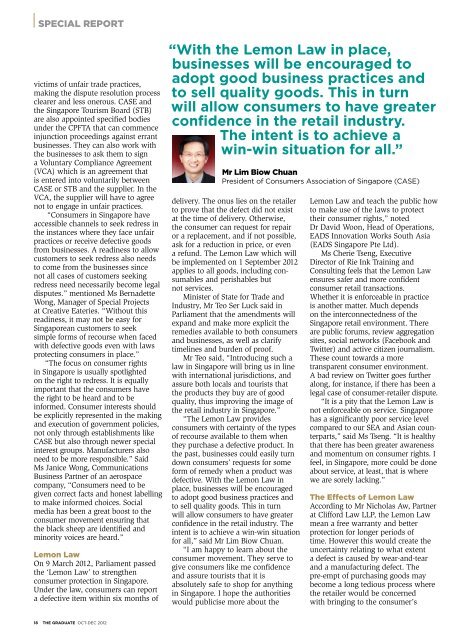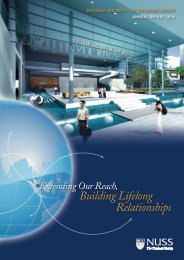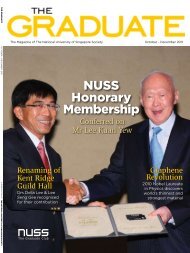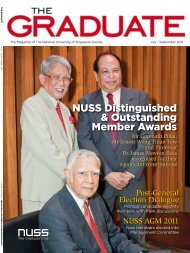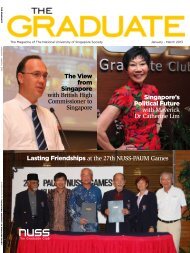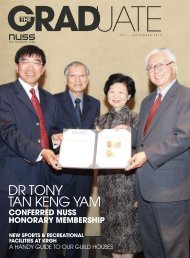NUSS bids farewell to Suntec City Guild House for the
NUSS bids farewell to Suntec City Guild House for the
NUSS bids farewell to Suntec City Guild House for the
You also want an ePaper? Increase the reach of your titles
YUMPU automatically turns print PDFs into web optimized ePapers that Google loves.
Special report<br />
victims of unfair trade practices,<br />
making <strong>the</strong> dispute resolution process<br />
clearer and less onerous. CASE and<br />
<strong>the</strong> Singapore Tourism Board (STB)<br />
are also appointed specified bodies<br />
under <strong>the</strong> CPFTA that can commence<br />
injunction proceedings against errant<br />
businesses. They can also work with<br />
<strong>the</strong> businesses <strong>to</strong> ask <strong>the</strong>m <strong>to</strong> sign<br />
a Voluntary Compliance Agreement<br />
(VCA) which is an agreement that<br />
is entered in<strong>to</strong> voluntarily between<br />
CASE or STB and <strong>the</strong> supplier. In <strong>the</strong><br />
VCA, <strong>the</strong> supplier will have <strong>to</strong> agree<br />
not <strong>to</strong> engage in unfair practices.<br />
“Consumers in Singapore have<br />
accessible channels <strong>to</strong> seek redress in<br />
<strong>the</strong> instances where <strong>the</strong>y face unfair<br />
practices or receive defective goods<br />
from businesses. A readiness <strong>to</strong> allow<br />
cus<strong>to</strong>mers <strong>to</strong> seek redress also needs<br />
<strong>to</strong> come from <strong>the</strong> businesses since<br />
not all cases of cus<strong>to</strong>mers seeking<br />
redress need necessarily become legal<br />
disputes.” mentioned Ms Bernadette<br />
Wong, Manager of Special Projects<br />
at Creative Eateries. “Without this<br />
readiness, it may not be easy <strong>for</strong><br />
Singaporean cus<strong>to</strong>mers <strong>to</strong> seek<br />
simple <strong>for</strong>ms of recourse when faced<br />
with defective goods even with laws<br />
protecting consumers in place.”<br />
“The focus on consumer rights<br />
in Singapore is usually spotlighted<br />
on <strong>the</strong> right <strong>to</strong> redress. It is equally<br />
important that <strong>the</strong> consumers have<br />
<strong>the</strong> right <strong>to</strong> be heard and <strong>to</strong> be<br />
in<strong>for</strong>med. Consumer interests should<br />
be explicitly represented in <strong>the</strong> making<br />
and execution of government policies,<br />
not only through establishments like<br />
CASE but also through newer special<br />
interest groups. Manufacturers also<br />
need <strong>to</strong> be more responsible.” Said<br />
Ms Janice Wong, Communications<br />
Business Partner of an aerospace<br />
company, “Consumers need <strong>to</strong> be<br />
given correct facts and honest labelling<br />
<strong>to</strong> make in<strong>for</strong>med choices. Social<br />
media has been a great boost <strong>to</strong> <strong>the</strong><br />
consumer movement ensuring that<br />
<strong>the</strong> black sheep are identified and<br />
minority voices are heard.”<br />
lemon law<br />
On 9 March 2012, Parliament passed<br />
<strong>the</strong> ‘Lemon Law’ <strong>to</strong> streng<strong>the</strong>n<br />
consumer protection in Singapore.<br />
Under <strong>the</strong> law, consumers can report<br />
a defective item within six months of<br />
18 THE GRADUATE Oct-Dec 2012<br />
“With <strong>the</strong> Lemon Law in place,<br />
businesses will be encouraged <strong>to</strong><br />
adopt good business practices and<br />
<strong>to</strong> sell quality goods. This in turn<br />
will allow consumers <strong>to</strong> have greater<br />
confidence in <strong>the</strong> retail industry.<br />
The intent is <strong>to</strong> achieve a<br />
win-win situation <strong>for</strong> all.”<br />
mr lim Biow chuan<br />
President of consumers Association of Singapore (cASe)<br />
delivery. The onus lies on <strong>the</strong> retailer<br />
<strong>to</strong> prove that <strong>the</strong> defect did not exist<br />
at <strong>the</strong> time of delivery. O<strong>the</strong>rwise,<br />
<strong>the</strong> consumer can request <strong>for</strong> repair<br />
or a replacement, and if not possible,<br />
ask <strong>for</strong> a reduction in price, or even<br />
a refund. The Lemon Law which will<br />
be implemented on 1 September 2012<br />
applies <strong>to</strong> all goods, including consumables<br />
and perishables but<br />
not services.<br />
Minister of State <strong>for</strong> Trade and<br />
Industry, Mr Teo Ser Luck said in<br />
Parliament that <strong>the</strong> amendments will<br />
expand and make more explicit <strong>the</strong><br />
remedies available <strong>to</strong> both consumers<br />
and businesses, as well as clarify<br />
timelines and burden of proof.<br />
Mr Teo said, “Introducing such a<br />
law in Singapore will bring us in line<br />
with international jurisdictions, and<br />
assure both locals and <strong>to</strong>urists that<br />
<strong>the</strong> products <strong>the</strong>y buy are of good<br />
quality, thus improving <strong>the</strong> image of<br />
<strong>the</strong> retail industry in Singapore.”<br />
“The Lemon Law provides<br />
consumers with certainty of <strong>the</strong> types<br />
of recourse available <strong>to</strong> <strong>the</strong>m when<br />
<strong>the</strong>y purchase a defective product. In<br />
<strong>the</strong> past, businesses could easily turn<br />
down consumers’ requests <strong>for</strong> some<br />
<strong>for</strong>m of remedy when a product was<br />
defective. With <strong>the</strong> Lemon Law in<br />
place, businesses will be encouraged<br />
<strong>to</strong> adopt good business practices and<br />
<strong>to</strong> sell quality goods. This in turn<br />
will allow consumers <strong>to</strong> have greater<br />
confidence in <strong>the</strong> retail industry. The<br />
intent is <strong>to</strong> achieve a win-win situation<br />
<strong>for</strong> all,” said Mr Lim Biow Chuan.<br />
“I am happy <strong>to</strong> learn about <strong>the</strong><br />
consumer movement. They serve <strong>to</strong><br />
give consumers like me confidence<br />
and assure <strong>to</strong>urists that it is<br />
absolutely safe <strong>to</strong> shop <strong>for</strong> anything<br />
in Singapore. I hope <strong>the</strong> authorities<br />
would publicise more about <strong>the</strong><br />
Lemon Law and teach <strong>the</strong> public how<br />
<strong>to</strong> make use of <strong>the</strong> laws <strong>to</strong> protect<br />
<strong>the</strong>ir consumer rights,” noted<br />
Dr David Woon, Head of Operations,<br />
EADS Innovation Works South Asia<br />
(EADS Singapore Pte Ltd).<br />
Ms Cherie Tseng, Executive<br />
Direc<strong>to</strong>r of Rie Ink Training and<br />
Consulting feels that <strong>the</strong> Lemon Law<br />
ensures safer and more confident<br />
consumer retail transactions.<br />
Whe<strong>the</strong>r it is en<strong>for</strong>ceable in practice<br />
is ano<strong>the</strong>r matter. Much depends<br />
on <strong>the</strong> interconnectedness of <strong>the</strong><br />
Singapore retail environment. There<br />
are public <strong>for</strong>ums, review aggregation<br />
sites, social networks (Facebook and<br />
Twitter) and active citizen journalism.<br />
These count <strong>to</strong>wards a more<br />
transparent consumer environment.<br />
A bad review on Twitter goes fur<strong>the</strong>r<br />
along, <strong>for</strong> instance, if <strong>the</strong>re has been a<br />
legal case of consumer-retailer dispute.<br />
“It is a pity that <strong>the</strong> Lemon Law is<br />
not en<strong>for</strong>ceable on service. Singapore<br />
has a significantly poor service level<br />
compared <strong>to</strong> our SEA and Asian counterparts,”<br />
said Ms Tseng. “It is healthy<br />
that <strong>the</strong>re has been greater awareness<br />
and momentum on consumer rights. I<br />
feel, in Singapore, more could be done<br />
about service, at least, that is where<br />
we are sorely lacking.”<br />
<strong>the</strong> effects of lemon law<br />
According <strong>to</strong> Mr Nicholas Aw, Partner<br />
at Clif<strong>for</strong>d Law LLP, <strong>the</strong> Lemon Law<br />
mean a free warranty and better<br />
protection <strong>for</strong> longer periods of<br />
time. However this would create <strong>the</strong><br />
uncertainty relating <strong>to</strong> what extent<br />
a defect is caused by wear-and-tear<br />
and a manufacturing defect. The<br />
pre-empt of purchasing goods may<br />
become a long tedious process where<br />
<strong>the</strong> retailer would be concerned<br />
with bringing <strong>to</strong> <strong>the</strong> consumer’s


